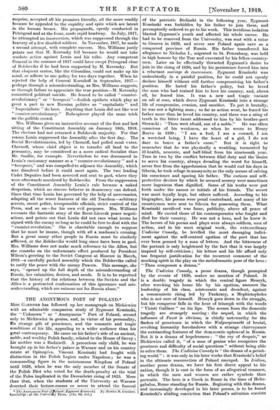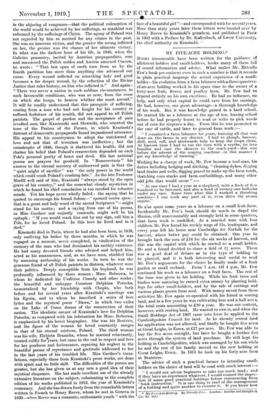THE ANONYMOUS POET OF POLAND.* Miss GARDNER has followed up
her monograph on Mickiewicz with an admirable companion study of Zygmunt Krasinski, the " Unknown " or " Anonymous " Poet of Poland, second only to Mickiewicz in genius, and, in virtue of his personality, His strange gift of prescience, and the romantic and tragic conditions of his life, appealing to a wider audience than his great contemporary. He came on his father's side of an ancient, noble, and wealthy Polish family, related to the House of Savoy ; his mother was a Radziwill. A precocious only child, he was brought up in his father's palace in Warsaw and on his country estate at Opinog6ra. Vincent Krasinski had fought with distinction in the Polish Legion under Napoleon ; he was a commanding figure in the autonomous Kingdom of Poland until 1828, when he was the only member of the Senate of the Polish Diet who voted for the death-penalty at the trial of the Poles implicated in the Decembrist rising of 1825. More than that, when the students of the University at Warsaw deserted their lecture-rooms en masse to attend the funeral of the patriotic Bielinski in the following year, Zygmunt Krasinski was forbidden by his father to join them, and peremptorily ordered to go to his work. This invidious isolation blasted Zygmunt's youth and affected his whole career. He had to be removed from the University, was sent with a tutor to Geneva in 1829, and never saw Poland again save as a conquered province of Russia. His father transferred his allegiance to Nicholas I., migrated to St. Petersburg, was held in high honour by the Tsar and execrated by his fellow-countrymen. Later on he effectually thwarted Zygmunt's desire to join in the rising of 1830, and by his persistence forced him into a reluctant manage de convenance. Zygmunt Krasinski was undoubtedly in a painful position, for he could not openly declare himself without still further compromising his father's position. He hated his father's policy, but he loved the man who had trained him to love his country, and, above all, he feared him. It was a new and tragic variant on odi et amo, which drove Zygmunt Krasinski into a strange life of compromise, evasion, and sacrifice. To put it brutally, he was not a fighting man ; so far as action went, he feared his father more than he loved his country, and there was a sting of truth in the bitter taunt addressed to him by his brother-poet Slowaeki Thou wert afraid, son of a noble." He was often conscious of his weakness, as when he wrote to Henry Reeve in 1830: I am a fool, I am a coward, I am a wretched being, I have the heart of a girl, I do not dare to brave a father's curse." But it is right to remember that he was physically a weakling, tormented by ill-health, neurotic, and half-blind from his nineteenth year. Torn in two by the conflict between filial duty and the desire to serve his country, always dreading the worst for himself, never free from the apprehension that he would end his days in Siberia, he took refuge in anonymity as the only means of salving his conscience and sparing his father. The curious and selfprotective devices by which he secured secrecy were sometimes more ingenious than dignified. Some of his works were put forth under the names or initials of his friends. The secret was most loyally kept, but others suffered. According to his biographer, his poems were penal contraband, and many of his countrymen were sent to Siberia for possessing them. What Krasinski sacrificed was fame, publicity, above all peace of mind. He envied those of his contemporaries who fought and died for their country. He was not a hero, and he knew it. The heroes of his poems and plays were always soldiers, men of action, and in his most original work, the extraordinary Undivine Comedy, he levelled the most damaging indictment against the self-centred egotism of the poet that has ever been penned by a man of letters. And the bitterness of the portrait is only heightened by the fact that it was largely inspired by self-criticism ; his letters and his life afford only too frequent justification for the recurrent comment of the mocking spirit in the play on the melodramatic pose of the hero " Thou composest a drama."
The Undivine Comedy, a prose drama, though prompted by the events of 1830, makes no mention of Poland. It is a double tragedy in which the central figure Henryk, after wrecking his home life by his egotism, assumes the leadership of his class, aristocratic and decadent, against a communistic rising led by Pankracy, a Mephistopheles who is not sure of himself. Henryk goes down in the struggle, but his conqueror falls in the hour of triumph with the words " Vicisti Galilaee " on his lips. The scenes from the domestic tragedy are strangely moving : the sequel, in which the influence of Faust is obvious, is chiefly noteworthy for the flashes of prescience in which the Walpurgisnacht of brutal, revolting humanity foreshadows with a strange clairvoyance the outstanding features of the democratic upheaval in Russia. But it is a drama of hopelessness : " the cry of despair," as Mickiewicz called it, " of a man of genius who recognizes the greatness and difficulty of social questions " without being able to solve them. The Undivine Comedy is " the drama of a perishing world " : it was only in his later works that Krasinski's belief in the ultimate resurrection of Poland emerged. In Iridion, another prose drama, we have his first direct appeal to his nation, though it is cast in the form of an allegorical romance, in which the men and women are rather symbols than portraits. The hero is a Greek in Rome in the time of Heliogabalus, Rome standing for Russia. Beginning with this drama, and increasingly developed in his later poems, is to be found Krasinski's abiding conviction that Poland's salvation consists in the abjuring of vengeance—that the political redemption of the world would be achieved by her sufferings, as mankind was redeemed by the sufferings of Christ. The agony of Poland was not regarded by him as merited for any crimes in the past. She was,an innocent victim, and the greater the wrong inflicted on her, the greater was the chance of her ultimate victory.
In what was the darkest hour of his life, in 1846, when the Galician peasantry, incited by Austrian propagandists, rose and massacred the Polish nobles and Austria annexed Cracow, he wrote : " That last span of earth torn from us by the fourth partition has more than anything else advanced our cause. Every wound inflicted on something holy and good becomes a far deeper wound, by the reflection of the Divine Justice that rules history, on him who inflicted it." And again : " There was never a nation in such sublime circumstances, in such favourable conditions, who was so near, from the cross on which she hangs, to heaven whither she must ascend." It will be readily understood that this panegyric of suffering, coming from a man who had not fought for his country or suffered forfeiture of his wealth, did not appeal to all Polish patriots. The gospel of pardon and the acceptance of pain revolted men like Kamienski and Slowacki, who resented the tone of the Psalms of the Future, in which Krasinski's distrust of democratic propaganda found impassioned utterance. His appeal to his countrymen to adopt the watchword of love and not that of terrorism was ineffective ; but the catastrophe of 1846, though it shattered his health, did not shatter his belief that Poland's resurrection depended on each Pole's personal purity of heart and deed. His last national poems are prayers for goodwill. In " Resurrecturis " his answer to the eternal mystery of undeserved pain is that the " quiet might of sacrifice " was the only power in the world which could crush Poland's crushing fate." As the late Professor Morfill well said of him, Krasinski " always stood by the open grave of his country," and the somewhat cloudy mysticism in which he found his chief consolation is too rarefied for robuster minds. Yet his hope never wholly failed : the saying that he quoted to encourage his friend Soltan—" aperavit contra seem : that is a great and holy word of the sacred Scriptures "—might stand for his motto ; and a saying from one of his poems, as Miss Gardner not unjustly contends, might well be his epitaph : " If you would mark him out by any sign, call him a Pole, for he loved Poland. In this love he lived and in it died."
Krasinski died in Paris, where he had also been born, in 1859, only outliving his father by three months, in which he was engaged on a memoir, never completed, in vindication of the memory of the man who had dominated his earthly existence. He had many devoted friends who advised and helped him, acted as his amanuenses, and, as we have seen, shielded him by assuming authorship of his works. In turn he was the generous friend of all Polish patriots in distress, whatever were their politics. Deeply susceptible from his boyhood, he was profoundly influenced by three women : Mme. Bobrowa, to whom he dedicated his Undivine Comedy and other works ; the beautiful and unhappy Countess Delphina Potocka, immortalized by her friendship with Chopin, who both before and for several years after Krasinski's marriage was his Egeria, and to whom he inscribed a series of love lyrics and the mystical poem " Dawn," in which two exiles on the Lake of Como dream of the resurrection of their nation. The idealistic nature of Krasinski's love for Delphina Potocka, as compared with his infatuation for Mine. Bobrowa, is emphasized by his latest biographer. She was his Beatrice, and the figure of the woman he loved constantly merges in that of his eternal mistress, Poland. The third woman was his wife, Eliteta Branicka, whom he married reluctantly, treated coldly for years, but came in the end to respect and love for her goodness and forbearance, repairing his neglect in the beautiful poems of repentance and gratitude addressed to her in the last years of his troubled life. Miss Gardner's translations, especially those from Krasinski's prose works, are done with spirit and no little skill. The difficulties of the poems are greater, but she has given us at any rate a good idea of their mystical eloquence. She has made excellent use of the already extensive literature on the subject, culminating in the complete edition of his works published in 1912, the year of Krasinski's centenary. And she has drawn freely from the remarkable letters written in-French to Henry Reeve, whom he met in Geneva in 1830—when Reeve was a romantic, enthusiastic youth " with the
••• face of a beautiful girl "—and corresponded with for several years. More than sixty years later these letters were handed over by Henry Reeve to Krasinski's grandson, and published in Paris in 1902 with a Preface by Dr. Kallenbach, of Lwow University, the chief authority on Krasinski.







































 Previous page
Previous page